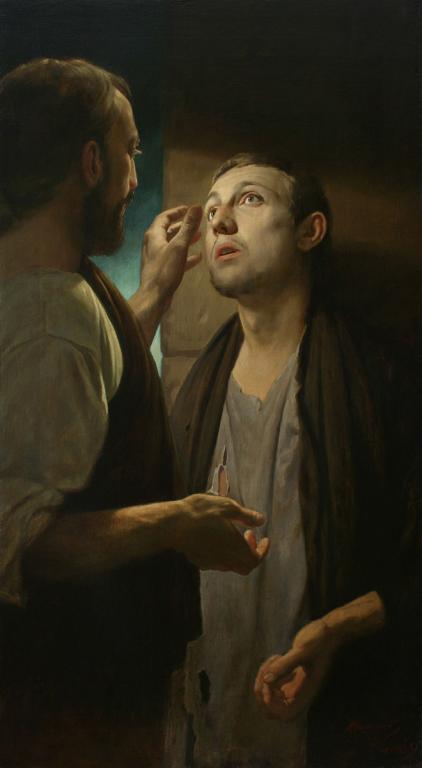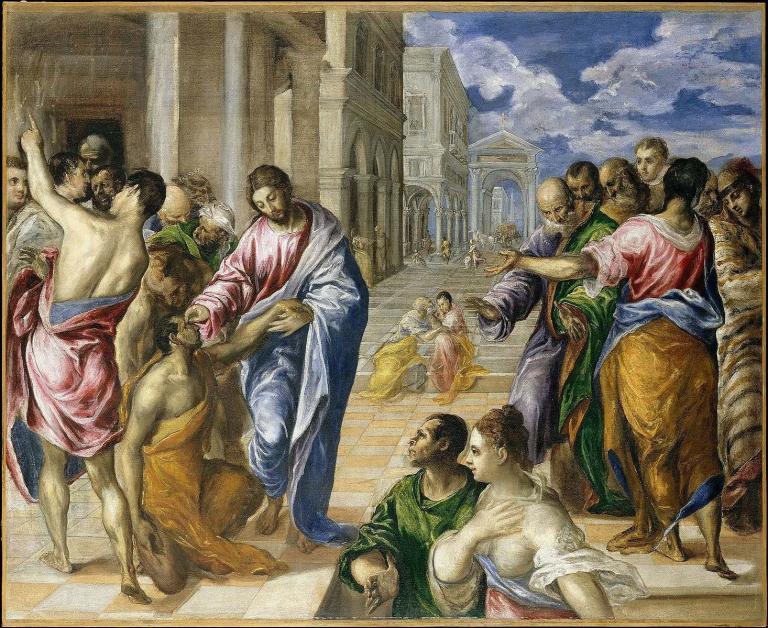John 9-10 offers a brilliant case study into the ways that biblical writers creatively undermine common notions about honor and shame, insiders and outsiders.
When you see it, you can’t unsee it. Plus, you’ll get a sense of how writers present “honor-shame reversal” in other passages. I’ll quote the key verses so you can see for yourself.
Both Blind and Cast Out
In the ancient world, few people suffered more than those with disabilities. The stigma could lead to being ostracized from society.
In John 9, people assume the man’s blindness is the consequence of someone’s sin. After he is healed, the Pharisees interrogate him about Jesus, who had restored the man’s sight. Unsatisfied with his answer, these leaders question the healed man’s parents.
His parents answered, “We know that this is our son and that he was born blind. But how he now sees we do not know, nor do we know who opened his eyes. Ask him; he is of age. He will speak for himself.” (His parents said these things because they feared the Jews, for the Jews had already agreed that if anyone should confess Jesus to be Christ, he was to be put out of the synagogue.) Therefore his parents said, “He is of age; ask him.” (9:20-23)

Even they seem to distance themselves from their son because they fear being put out of the synagogue.
Throughout John, especially chapters 9–10, there is a repeated emphasis on being outsiders. So that you don’t take my word for it, let’s look at some examples. In John 9:29-34, the formerly blind man answers the questions posed to him by the authorities who state,
“We know that God has spoken to Moses, but as for this man, we do not know where he comes from.” The [formerly blind] man answered, “Why, this is an amazing thing! You do not know where he comes from, and yet he opened my eyes. We know that God does not listen to sinners, but if anyone is a worshiper of God and does his will, God listens to him. Never since the world began has it been heard that anyone opened the eyes of a man born blind. If this man were not from God, he could do nothing.” They answered him, “You were born in utter sin, and would you teach us?” And they cast him out.
John then reiterates this detail in 9:35: “Jesus heard that they had cast him out, and having found him he said, ‘Do you believe in the Son of Man?’” Although healed, he sees no one who will stand by his side. Jesus then reorients the Pharisee’s understanding of disability. It is they, who deny their need, who are truly blind (9:41).
Reading John 9-10 in Context
Before we see the link between John 9 and 10, pause and compare how John weaves this theme (“being cast out”) into other parts of his Gospel.
“All that the Father gives me will come to me, and whoever comes to me I will never cast out.” (John 6:37)
“Now is the judgment of this world; now will the ruler of this world be cast out. And I, when I am lifted up from the earth, will draw all people to myself.” He said this to show by what kind of death he was going to die.” (12:31–33)
“Nevertheless, many even of the authorities believed in him, but for fear of the Pharisees they did not confess it, so that they would not be put out of the synagogue; for they loved the glory that comes from man more than the glory that comes from God.” (12:42–43)
“I have said all these things to you to keep you from falling away. They will put you out of the synagogues. Indeed, the hour is coming when whoever kills you will think he is offering service to God.” (16:1-2)
These verses reiterate the same imagery and vocabulary. The writer touches on a point he thinks will hit home with his audience. This background explains why John 10 should strike a nerve in John’s readers.
Whereas the authorities reject the healed man, Jesus seeks out and finds him, although still overlooked by society.
Where does the shepherd lead his sheep?
In John 10, Jesus helps us to interpret the events of John 9, explaining that he overturns social expectations.[1] He compares himself to a shepherd saying,
“The sheep hear his voice, and he calls his sheep by name and leads them out. When he has brought out all his own, he goes before them, and the sheep follow him, for they know his voice.” (10:3-4)
The same root word translated as “brought out” appears in 9:34, 35 and highlights a reoccurring theme throughout John. We see this in the verses quoted above (i.e., 6:37; 9:22; 12:42–43; 16:2).
What is Jesus saying? The sheep who are outside the pen with the Shepherd are insiders in Jesus’ eyes. Those who are considered outsiders by society are welcomed as insiders in God’s family! Now, outsiders have a place of honor!
We need not fear being cast aside by others or ignored by so-called people of influence. Jesus reverses conventional notions of status. He can set aside whatever causes anxiety and despair. Although the world can be confusing, scary, and hurtful, we are simply called to follow the good Shepherd’s voice.
[1] Again, readers could overlook this point if they forget that chapter divisions were inserted many centuries after John’s Gospel was written
** This post expands on a briefer entry included in Seeking God’s Face: Practical Reflections on Honor and Shame in Scripture.














